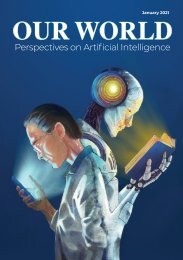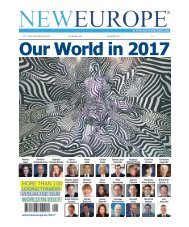Our World in 2018
Leading minds reflect on the state of our societies, and examine the challenges that lie ahead. An edition dedicated to generating ideas that will help form a new vision for our world.
Leading minds reflect on the state of our societies, and examine the challenges that lie ahead. An edition dedicated to generating ideas that will help form a new vision for our world.
You also want an ePaper? Increase the reach of your titles
YUMPU automatically turns print PDFs into web optimized ePapers that Google loves.
GLOBAL VS. LOCAL WORLDS
ended up handing over power to
another. How did this happen?
At the beginning of the 20th century,
conservatives and liberals were unable
a democratic foundation for Russia. As
a result, the most reactionary faction
within the governing elite came to
dominate after the revolution of
1905, stymieing the development of
democratic reforms.
After the overthrow of the czar
in 1917, democracy once again lost
out. The Bolsheviks were in essence
just as autocratic as the reactionaries
who came before them, only with the
opposite “ideological polarity.” They
may have managed to swap the minus
and plus signs in a few places, but the
Bolsheviks were never able to break
R
authoritarianism.
History repeated itself with the
rise of Boris Yeltsin, even though he
was Russia’s first popularly elected
leader. In the early 1990s, the new
president was granted extraordinary
constitutional powers, with victorious
liberals referring to Mr. Yeltsin as
.
elected president in 2000, the former
K.G.B. lieutenant colonel inherited a
system perfectly designed to sustain
Russia’s authoritarian traditions.
A significant part of the Russian
opposition today, unlike opposition
movements in the West, sees
democratic rights as emanating not
from balanced political representation,
but from the appointment of a
“good czar.” This tendency to pursue
a magnanimous ruler instead of
democratic institutions forces
ambitious political leaders to seek
public support by relying on the force
of their own personality rather than
on a clear political program. To win,
politicians need to create an image of
a “strong leader.”
The challenge facing democratically
minded Russians therefore isn’t simply
to remove Mr. Putin from power; it’s
to replace the authoritarian system he
.T
1991 teach us that the Kremlin cannot
establish democracy by decree, and
that democratic institutions will not
spring up across the whole of Russia’s
territory at once.
The process must begin with the
political transformation of Europeanoriented
Russia and its cities: Moscow,
St. Petersburg, Yekaterinburg and
Novosibirsk, among others. These
DAMON WINTER/THE NEW YORK TIMES
Do Russia’s size,
political culture
and distrust
of the Western
world make it
unsuitable for
democracy?
Absolutely not.
urban centers can demonstrate to the
rest of the country how a majority of
the voters can respect the minority, and
vice versa, by bringing decision-making
closer to the people and by holding
.
When Russian society becomes
aware of its own power, its people
local democratic culture and the
institutions required to support it.
The most important task is to create a
justice system based on the rule of law
rather than on arbitrary power.
To the Kremlin, these ideas are
heresy: They undermine the centuries-
R
governed only from Moscow and that
the delegation of power will lead to
chaos. We must embrace a new and
if we want Russia to be a successful,
respected country able to make a
positive contribution to international
relations.
The 1990s teach us another lesson:
that it is the Russian people, and the
R
their own way forward. The West
cannot do it for us.
OUR WORLD | 2018
© 2018 Mikhail Khodorkovsky. Distributed by The New York Times Syndicate
155










